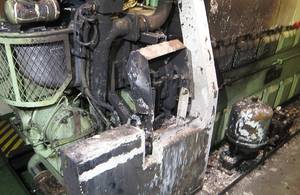Training Issues Highlighted in LPG Carrier Engine Room Fire
The UK Marine Accident Investigation Branch (MAIB) has published its accident investigation report into the fatal engine room fire on board Moritz Schulte on August 4, 2020, citing training issues.
On 4 August 2020, a fire broke out in the engine room of the liquefied petroleum gas/ethylene carrier Moritz Schulte when the recently promoted third engineer opened an auxiliary engine’s pressurised fuel filter allowing marine gas oil to spray onto an adjacent auxiliary engine’s hot exhaust.

The third engineer attempted to stop the fuel leak and tried unsuccessfully to escape from the toxic smoke-filled engine room. Prompt actions by the crew closed down the space to limit the spread of fire. The subsequent crew muster identified that the third engineer was missing and had last been seen in the engine room. The master prohibited the release of the CO2 fixed firefighting system and ordered the fire party to search for and recover the third engineering officer.
The team made two attempts to enter the engine room, both of which were unsuccessful due to smoke and heat. The third attempt made a sweep of the area of the engine room where it was assessed that the third engineer would be, but he was not found. He was found an hour later by a shore fire and rescue team but did not recover consciousness and died nine days later in hospital.
The report highlighted crew training scheme weaknesses that enabled the crew member to bypass requirements and gain promotion twice when he was not ready. It also highlighted inadequate crew fire training, affecting the potential for a successful escape and recovery of a crew member from a smoke-filled environment.
The investigation found that, despite the vessel having a full range of safe systems of work in place, the third engineer, who had worked for the company for over five years, died while attempting an unnecessary job conducted in an unsafe way at an inappropriate time, without a risk assessment and in the absence of any direct supervision of the task.
Analysis of the third engineer’s training program activity log found that only two of the 65 rank-specific tasks he was required to undertake before his promotion to third engineer had been completed with the requisite evidence.
Related News


